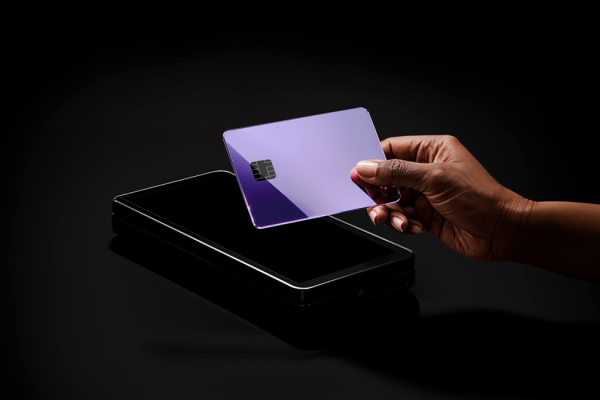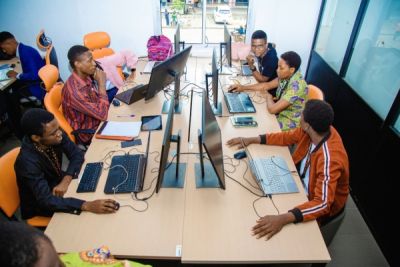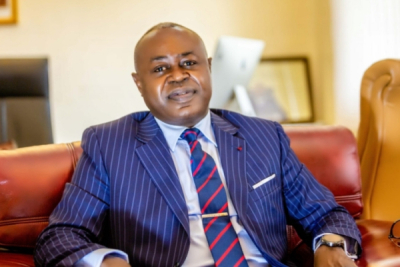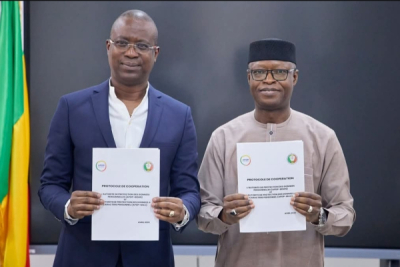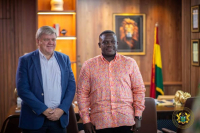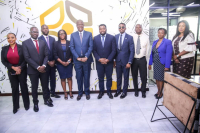Intel has launched the 2025 edition of its Community Reach Program, inviting proposals for AI and broadband-powered projects aimed at underserved communities across African Union member states.
The initiative seeks to support solutions in STEM education, healthcare, agriculture, environmental services, fintech, and digital skills readiness. Organizations, startups, SMEs, and institutions leveraging AI, particularly Edge AI and AI PCs, and broadband connectivity are encouraged to apply.
Selected applicants will receive technical support, capacity-building opportunities, and consultancy services to scale their solutions. Applications are open until June 13, 2025.
South African fintech company Stitch has secured $55 million in a Series B funding round led by QED Investors. The round also included participation from Flourish Ventures, Glynn Capital, Norrsken22, and existing investors such as Ribbit Capital and PayPal Ventures. Notably, comedian and entrepreneur Trevor Noah joined as an angel investor.
Stitch plans to use the funds to enhance its in-person payments offering, introduce card acquiring capabilities, and strengthen its online payments suite to better serve enterprise clients across Africa.
With this funding, Stitch is well-positioned to continue its mission of transforming the payments landscape in Africa and beyond.
To secure transport routes and payments in African cities, two tech entrepreneurs have launched a multi-functional mobile platform for shared taxis, minibuses, and other transportation services.
Loop, an e-mobility solution created by a South African startup, is enabling informal taxi drivers and collective transport operators – particularly the minibuses and shared taxis prevalent across sub-Saharan Africa – to digitize their services. The Cape Town-based startup was founded in 2022 by Imtiyaaz Riley and Jamie Wyngaard.
“In a nutshell, the platform brings real-time logistics, financial inclusion, and operational efficiency to markets still heavily reliant on cash and manual coordination," said Imtiyaaz Riley.
Loop allows drivers to log their trips, monitor their finances in real time, and accept digital payments. Passengers, in turn, gain from improved tracking and a secure, cashless payment system. "We earn revenue from ride fares and payment transaction fees. In 2024, we generated over US$1.3 million in revenue," Riley added.
Beyond its core service, Loop also provides a formalization tool. By gathering data on transport patterns and travel behaviors, the platform assists local authorities and private partners in gaining a clearer understanding of urban mobility dynamics and enhancing their offerings. Currently operating in Johannesburg as well, the company has ambitions to expand into other countries within sub-Saharan Africa.
By merging smart mobility, integrated payments, and digital inclusion, Loop offers a versatile tool to help structure transport ecosystems that frequently operate outside formal regulatory frameworks.
By Adoni Conrad Quenum,
Editing by Feriol Bewa
As the digital economy takes on a more prominent role in global commerce, African nations are working to improve the regulation of digital activity. Senegal is viewing digital taxation as a key tool for asserting its sovereignty and boosting its resources in an era dominated by major online companies.
Senegal collected over one billion CFA francs, equivalent to more than $1.7 million, in 2024 from its recently introduced value-added tax (VAT) on digital services, the country's tax authority announced. Jean Koné, the Director General of Taxes and Domains (DGID), revealed the results on Tuesday, April 15, during the international conference on digital economy taxation in Africa, held in Dakar.
Encouraged by these initial returns, the tax administration intends to intensify its efforts to collect even greater resources in the coming years. "We will implement strategies and innovate to ensure everyone pays the digital VAT. It is also about adapting our system to make it more inclusive and efficient," Koné said. Over the medium term, the government is targeting revenues between 3 and 5 billion CFA francs, with projections reaching as high as 10 billion.
Implemented on July 1, 2024, the tax applies to services provided by both domestic companies and foreign digital platforms operating within Senegal. Unlike a flat tax, the taxable base is calculated from the actual turnover of non-resident providers, based on compensation received or owed. This method more accurately reflects the revenue generated within the Senegalese market.
Senegal's standard VAT rate is set at 18%, with a specific 10% reduced rate for sectors facing difficulties, such as hospitality and restaurants, which were impacted by the COVID-19 pandemic. The tax specifically targets streaming services, software subscriptions (SaaS), cloud computing, online advertising, downloadable games, and paid mobile applications.
While the measure increases state revenues, it also carries implications for consumers. By taxing platforms based on their actual income, the prices of certain digital services could increase, potentially excluding the most vulnerable populations. The key challenge for authorities will be to balance tax efficiency with digital accessibility, ensuring that digital transformation does not come at the cost of inclusion.
By Samira Njoya,
Editing by Sèna D. B. de Sodji
- Congo signs MoU with Russia's Higher School of Economics to boost digital skills training
- Agreement announced at Gitex Africa, focuses on training youth to support nationwide digitization
The Congolese government has secured an agreement for Russian expertise to enhance the digital skills of its population. A memorandum of understanding was signed on Tuesday with Moscow's Higher School of Economics (EHESE) on the sidelines of the third Gitex Africa exhibition, which concludes on Wednesday.
"To train in the digital field, you need access to digital expertise. The purpose of this memorandum is to facilitate the exchange and advancement of expertise to train young Congolese, because the goal is to digitize all spheres of our administration. And when we talk about digitization, if you don’t have the necessary skills, it’s very difficult," Léon Juste Ibombo, Congo's Minister of Posts, Telecommunications and the Digital Economy, told RT television.
The Congolese government has identified digital skills as a cornerstone of its digital transformation strategy, alongside innovation and entrepreneurship. This priority has already led to initiatives such as the establishment of the African Center for Research in Artificial Intelligence (CARIA), with support from the United Nations Economic Commission for Africa (UNECA). In March, Congo also began discussions to join the Give1Project program, an initiative backed by the United Nations Development Programme (UNDP), Microsoft, and France, which aims to train 25,000 young Africans in digital skills. Furthermore, a partnership has been forged with Mohammed VI Polytechnic University, among others.
By prioritizing digital skills training, the Congolese government aims to empower its citizens to actively participate in the burgeoning digital economy and cultivate a skilled workforce capable of addressing both national and regional demands. The World Bank, for instance, projects that nearly 230 million jobs in sub-Saharan Africa will require digital skills by 2030. The Bretton Woods institution estimates Congo's youth unemployment rate at approximately 42%, in a nation where nearly half of the population is under the age of 18.
However, it is important to note that the agreement signed in Marrakech is currently a memorandum of understanding, and the specific terms and a timeline for a formal agreement have not been disclosed. Several key details remain unclear, including the number of beneficiaries, the targeted age groups, the selection criteria for participants, and the precise digital skills that will be taught. Further developments will be necessary to fully evaluate the potential impact and concrete prospects of this nascent partnership.
Isaac K. Kassouwi
- Benin and Mali sign data protection cooperation agreement
- Pact aims to enhance best practice sharing, joint complaint handling, and compliance checks
- Countries to develop shared regulatory standards via technical committees
Benin's Personal Data Protection Authority (APDP) said on Tuesday it signed a cooperation agreement with its counterpart in Mali, seeking closer ties as digital sovereignty issues gain traction in West Africa.
The initiative will foster regular exchanges of best practices and the sharing of operational tools between the two data protection agencies, the APDP announced. The agreement also allows for the joint handling of specific complaints or compliance checks.
Furthermore, Benin and Mali will work towards developing common regulatory standards through dedicated technical committees. They plan to hold joint commissions every two years and organize shared training sessions to enhance the skills of their respective staff.
This collaboration aligns with a broader continental movement spearheaded by the African Network of Personal Data Protection Authorities (RAPDP), which promotes the harmonization of digital regulation across the continent. The move comes as the protection of personal data increasingly becomes a strategic priority for African nations.
According to Africa Cybersecurity Magazine, 37 of the continent's 54 countries now have national laws addressing personal data protection, including both Benin and Mali. However, the effective enforcement of these laws remains a hurdle in several nations.
Through this agreement, Benin and Mali aim to forge a unified approach to the escalating complexities of digital regulation. In a landscape characterized by the cross-border movement of data, the compatibility of legal frameworks is increasingly vital. This partnership could facilitate a more coordinated response to potential threats and help establish a strong foundation of digital trust within West Africa.
By Samira Njoya,
Editing by Sèna D. B. de Sodji
This partnership could help Ghana in its digitalization agenda, improve service delivery, enhance climate resilience, and build a greener, smarter economy. By aligning with a partner like Denmark, Ghana is expanding its capacity to tackle complex development challenges through technology-driven, inclusive solutions.
On April 11, Ghana’s Minister for Communication, Digital Technology and Innovations, Samuel Nartey George, held talks with a Danish Embassy delegation led by Ambassador Tom Norring. The meeting explored opportunities for collaboration in digitalization, innovation, and climate resilience, aiming to strengthen bilateral ties and draw on Denmark’s global expertise in technology and sustainable development.
The meeting highlighted the growing role of Techplomacy—the intersection of technology, diplomacy, and international cooperation—as a driving force in shaping Ghana’s digital future.
Ghana aims to adopt Danish GovTech platforms like cBrain’s F2 and eBoks to improve public service access. The partnership also supports Ghana’s green transition by leveraging Denmark’s expertise in renewable energy and eco-friendly technologies. Denmark’s experience in entrepreneurship and digital startups could help grow Ghana’s local tech industry. Ghana also seeks to collaborate with the Danish Meteorological Institute (DMI) to enhance GMet’s weather forecasting and climate data systems, improving climate resilience and disaster preparedness.
Ghana has made progress in digital governance but still faces key challenges. According to the 2024 UN E-Government Development Index, which measures how effectively governments use digital technologies to deliver public services, Ghana ranks 108th out of 193 countries, highlighting gaps in service delivery, infrastructure, and online access despite ongoing efforts.
In contrast, Denmark ranks 1st, reflecting its leadership in digital public services, strong infrastructure, and high citizen engagement. Ghana’s partnership with Denmark offers a chance to gain technical expertise and insights to build more efficient, inclusive digital systems. Strengthening such collaborations can help Ghana accelerate its digital transformation and improve its global ranking.
This engagement marks a significant step toward future Ghana–Denmark tech cooperation, with potential to deliver long-term benefits across public service delivery, climate resilience, and innovation-led growth.
Hikmatu Bilali
The Africa Tech Summit London returns for its ninth edition on June 6, 2025, at the London Stock Exchange, bringing together African tech leaders, investors, and global partners to drive collaboration and investment across the continent’s tech ecosystem.
Preceding it, the Africa Climate Tech & Investment Summit on June 5 will focus on innovations at the intersection of climate, technology, and finance, showcasing solutions for Africa’s green transition and climate resilience.
Under the theme “Where African Tech Connects,” both summits offer a platform to explore trends, build partnerships, and connect with key players shaping Africa’s digital and climate future.
TerraPay, a global money movement company, and PayPal, a global digital payments and commerce platform, have entered a partnership to enable real-time fund transfers across the Middle East and Africa (MEA) for PayPal customers.
The collaboration, announced on April 15, aims to expand financial access by connecting banks, mobile wallets, and financial institutions, making cross-border transactions faster and more accessible.
Through this partnership, users can link mobile wallets or bank accounts to PayPal and transfer funds seamlessly. The partnership is set to strengthen the region’s financial infrastructure and support broader participation in the global economy.
Zambia, like many African countries, faces the challenge of brain drain, with skilled tech professionals leaving for better opportunities abroad. The survey will address this by informing policies that could retain local talent, foster better job opportunities, and create an environment conducive to innovation.
Zambia has launched the State of the Developer Ecosystem in Zambia Survey 2025, a collaborative effort between the ICT Association of Zambia (ICTAZ) and BongoHive, a technology and innovation hub. The survey, announced on April 11, aims to guide Zambia’s digital transformation, with insights on the needs, challenges, and goals of the developer community.
At the launch, Minister of Technology and Science, Hon. Felix Mutati, commended BongoHive and ICTAZ for their foresight and leadership in launching the state of the developer Ecosystem in Zambia Survey 2025.
The survey will address several key areas. First, it will focus on skills development, ensuring that developers have continuous access to learning and training in emerging fields like AI, blockchain, and cybersecurity. It will also tackle employment and opportunities to retain talent and reverse brain drain through targeted policies. Entrepreneurship and innovation will be prioritized, with a focus on providing tech start-ups with capital, mentorship, and supportive policies. The survey will also examine overcoming barriers, emphasizing the importance of improving innovation quality to attract funding and support. Lastly, it will explore the strategic pillars of skills development and entrepreneurship to further boost digital growth.
According to the Ministry of Technology and Science, the ICT sector grew 17.8% in 2024, contributing 3.5% to GDP. This growth demonstrates that digital technology is increasingly becoming a key driver of economic progress. By focusing on the developer ecosystem, the government aims to sustain this momentum and ensure the sector is equipped to meet future challenges. As technology continues to disrupt industries, from agriculture to finance, the demand for skilled developers is more critical than ever to fuel the digital economy.
Hikmatu Bilali
More...
- Mauritius plans mandatory registration for online vendors to improve e-commerce regulation
- Proposed registry will require sellers to obtain licenses and meet compliance standards
- Initiative aims to curb digital scams and improve consumer protection through seller traceability
Online vendors in Mauritius will soon face mandatory registration under initial proposals discussed between Commerce Minister Michaël Sik Yuen and consumer groups. The measure aims to tighten e-commerce regulations and combat the increasing number of digital scams by ensuring seller traceability and enhanced consumer protection.
The project envisions creating an official registry of online sellers operating in Mauritius. Each online merchant will be required to obtain a license to operate legally and comply with a defined set of standards. These requirements are intended to provide clearer oversight of the sector and help differentiate legitimate sellers from illegal operators.
Highlighting the need for such regulation, Jayen Chellum, Secretary-General of the Consumers’ Association of Mauritius (ACIM), said: "It only takes someone posting a product [on social media, Editor’s note], requesting payment through a bank account or mobile app, and the customer never receives the order. We’ve seen cases both locally and internationally."
Local media outlets quoted the minister as saying that the first draft of the registry is expected in the coming weeks. Authorities plan to implement an inclusive, flexible, and gradual process to ensure the system's success and prevent segments of the digital economy from reverting to informality.
By Adoni Conrad Quenum,
Editing by Feriol Bewa
- Madagascar launches $24 million DECIM program to distribute smartphones and boost digital access
- 664,000 devices to be distributed, including 400,000 for women and girls
- Initiative targets increased internet adoption and digital inclusion, especially in remote areas
Last week, the government of Madagascar kicked off a program to distribute digital devices, including smartphones, to its citizens under the $24 million Digital and Energy Connectivity for Inclusion in Madagascar Project (DECIM). The initiative aims to boost internet adoption and the use of digital services nationwide.
According to the CSM Association (GSMA), the inability to afford internet-enabled phones is a major obstacle to technology adoption in areas with existing mobile network coverage. While the GSMA notes that many devices are now priced below $100, this still remains unaffordable for a large segment of the population.
In Madagascar, a $100 smartphone represents nearly 20% of the country’s annual gross national income (GNI) per capita, which the World Bank estimated at $510 in 2023. Even with an average phone lifespan of three years, the cost of acquisition remains substantial, particularly given that many basic needs take precedence.
As part of the initiative, the Malagasy government plans to distribute 664,000 connected digital devices, with 400,000 specifically earmarked for women and girls. The program seeks to reduce disparities in technology access and bolster digital and economic inclusion. A dedicated platform for the “Sale of Digital Devices with Internet Access” will soon be launched, featuring targeted subsidies, a credit line for distributors and financial institutions, a focus on remote areas, and the promotion of mobile money for financial inclusion.
This government effort aligns with broader digital transformation goals outlined in the Digital Strategic Plan (PSN) 2023–2028. Authorities aim to position Madagascar as a key player in Africa’s digital economy by developing telecommunications, e-government services, and digital inclusion. The government is targeting a 6% contribution from the digital sector to GDP by 2028, up from just 1.5% in 2019.
However, smartphone ownership alone does not guarantee internet usage or engagement with digital services, even where network coverage exists. “Among current mobile internet users, many would like to use it more but face a range of barriers to increasing their usage. The main constraints include security concerns, affordability, and connectivity experience. Perceived lack of relevance also plays a role,” the GSMA noted in its State of Mobile Internet Connectivity Report 2024, published in October 2024.
It is important to note that the Malagasy government has not announced any subsequent phases for the program, which remains limited in scope given the country’s estimated population of 31.2 million. In fact, according to the International Telecommunication Union (ITU), approximately 80% of the Malagasy population do not use the internet.
By Isaac K. Kassouwi,
Editing by Sèna D. B. de Sodji
Created by an Ivorian entrepreneur, the platform aims to tackle logistical hurdles and unclear practices in construction material supply.
Blok, an online commerce platform launched in 2023 by Waly K. N’Diaye and Yohann Behi, enables users—including contractors, small businesses, and individual buyers—to order construction materials directly from their smartphones, without needing to travel to physical stores. The Abidjan-based firm is targeting a fragmented supply chain with a mobile-first approach.
The startup first gained traction by offering geolocation and local address indexing services. It later pivoted toward the building sector, where demand is high but transparency and logistics remain major pain points.
Available on both iOS and Android, the Blok Africa app has been downloaded more than 500 times, according to Google Play Store data. Through the app, users can browse product listings, compare prices, choose quantities, and schedule deliveries directly to their worksites or retail shops.
But Blok isn’t just a tool for buyers. It also helps small-scale merchants and material distributors boost their visibility and manage inventory more efficiently. The platform is designed to formalize and digitize day-to-day operations in a sector that often runs on informal networks.
Blok Africa supports a range of payment methods, including mobile money platforms such as Wave, Orange Money, and MTN Money. For users who prefer to pay in cash, the company offers a pay-on-delivery option. “We deliver the same day if you order before 10 a.m., or the next day—either in the morning or afternoon depending on your preference,” the startup says.
By Adoni Conrad Quenum,
Editing by Feriol Bewa
With the upcoming rollout, Ghana is taking a significant step forward in building a more efficient, secure, and inclusive digital ecosystem.
Starting June 2025, SIM card re-registration in Ghana will go fully online, allowing citizens to complete the entire process online—no visits to physical registration centers will be required. The announcement was made on April 8 by Minister for Communication, Samuel Nartey George during a visit to Margins ID Group (Intelligent Card Production Systems) in Accra.
The initiative is part of the government’s broader effort to streamline public services and accelerate the country’s digital transformation. “This system will save time, improve accuracy, and offer a more convenient experience for all Ghanaians,” the Minister noted.
Under the new system, citizens will be able to register their SIM cards using their Ghana Card through a fully online platform, with automatic verification replacing in-person, manual checks.
Ghana’s SIM card re-registration campaign began in 2021, requiring all SIM holders to re-register their numbers using the Ghana Card, the national identity document. However, the process has faced multiple delays due to low registration rates and logistical challenges—including long queues, technical issues, and limited access to registration centers.
According to an update from the Ministry of Communications dated November 11, 2022, and signed by then-Minister Ursula Owusu-Ekuful, 30,011,082 individuals had completed the first phase of registration by linking their Ghana Card to their SIM number. Of these, 20,892,970 had completed the full process, including biometric verification—representing nearly 70% of total registrations at the time.
Despite the progress, millions of SIM cards remained unregistered, prompting repeated deadline extensions and concerns about service disruptions for those unable to complete the process. By moving to a fully online system, the government aims to close the remaining registration gap and reduce the administrative burden for both citizens and telecom operators. The updated system is expected to improve access, boost compliance, and enhance data accuracy.
Beyond convenience, online re-registration is also critical to national goals. The government hopes to strengthen security by curbing fraudulent SIM use and ensuring better regulation of the telecom sector through accurate subscriber data.
Hikmatu Bilali



